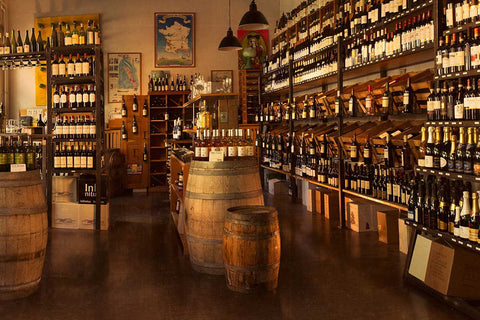FAQ
What you should know as a wine beginner
Feel free to contact us or check out our recommendations or sample packages. We'd also be happy to put together a customized package for you, tailored to your taste.
It's best stored lying down, cool and dark, at a constant temperature (between 10 and 16 °C). A cellar or a special wine refrigerator is ideal.
Natural wines are produced with as little intervention as possible: spontaneously fermented, unfiltered, and without additives. They can taste surprising, lively, or even a bit "wilder" than traditional wines—that's precisely what makes them exciting!
Many of our wines are vegan—meaning they're made without animal-derived clarifying agents like gelatin or egg white. You'll find relevant information in the product details, or you can simply ask us directly.
Here is a small guideline:
– White wine: 8–12 °C
– Rosé: 9–12 °C
– Red, light wine: 14–16 °C
– Red, strong wine: 16–18 °C
– Sparkling wine: 6–8 °C
Tip: It's better to serve it a little too cool – it quickly gets warmer in the glass.
Once opened, wine will keep for approximately 2–5 days. White and rosé wines should be refrigerated and consumed within 2–3 days. Red wines can often keep a little longer at room temperature.
Sparkling wine loses carbon dioxide quickly – best enjoyed within 1-2 days.
Not absolutely necessary, but with full-bodied red wines or natural wines, decanting can help develop aromas. With young wines, a little air often brings freshness, while with older wines, it removes sediment.
Here are a few classics:
– White wine: fish, light sauces, cream cheese
– Rosé: Grilled food, Mediterranean cuisine
– Red wine: beef, game, mature cheese
– Sweet wine: dessert, blue cheese
In our wine descriptions you will often find specific food pairing tips!
Many white wines are ready to drink, but some high-quality wines gain depth with ageing. Red wines often benefit from 2–5 years of rest—especially if they have tannins and acidity. Rule of thumb: the more structured the wine, the greater its ageing potential.
Unfiltered wines have not been mechanically clarified after fermentation. As a result, they often appear denser, more natural, and contain more suspended solids—which is absolutely not a quality defect, but rather part of the style (e.g., in natural wine).
– Organic : controlled avoidance of synthetic substances in the vineyard
– Biodynamic : additionally according to anthroposophical principles (e.g. lunar calendar)
– Close to nature : not a protected term, but often ecologically oriented – without a seal
Because they are often unsulfured or only minimally sulfurized. Oxidation isn't necessarily a bad thing—it brings nutty, appley, or sherry-like notes, which can be desired. What matters is whether it occurs in a controlled manner or becomes a false note .
– White: Riesling, Chenin Blanc, Chardonnay (especially from Burgundy)
– Red: Nebbiolo, Cabernet Sauvignon, Syrah, Pinot Noir (with good structure)
– And not to forget: sweet wines – some live longer than us 😅
With these questions you can shine at every tasting
"Terroir" describes the interplay of soil, climate, location, and craftsmanship—everything that shapes the character of a wine. Two identical grape varieties can taste very different depending on where they were grown.
A cuvée is a blend of several grape varieties (or vineyards/vintages), while a single-varietal wine consists of only a single grape variety. Both have their appeal: cuvées often offer balance, while single-varietal wines exhibit varietal character.
The choice of yeast (spontaneous vs. pure yeast) has a tremendous impact on the flavor profile. Spontaneous fermentation often brings complex, sometimes unpredictable notes—yeast, herbs, spice—while pure yeast tends to emphasize specific, varietal flavors. Extended yeast contact (sur lie) also creates more texture and depth.
Because grape varieties such as Pinot Noir or Riesling are very "terroir-sensitive." Cool climates produce more delicate, acidic wines, while the same variety in warm climates produces more full-bodied, fruitier, and higher-alcohol wines. Harvest time, soil structure, and cultivation also play a role.
– Barrique : approx. 225 l, mostly made of French oak – gives distinct roasted aromas
– Tonneau : approx. 500 l – more volume, slightly softer wood influence
– Foudre : large wooden barrels (>1000 l), often for long storage – hardly any aroma, rather micro-oxidation
The choice significantly influences oxidation, tannin structure and aroma.
Batonnage (stirring the lees during aging) can add more texture, body, and complexity to white wines. It's especially popular with Burgundy or oak-aged white wines. It adds nutty notes, more texture, and can also increase aging potential.
Reductive wines (e.g., Riesling, Sauvignon Blanc) tend to have sulfurous, mineral notes ("flint," "matchstick") in their youth. However, they often develop excitingly with air. Such wines usually benefit from decanting or short aging.
It describes the moment when the tannins (especially in skins and seeds) are ripe, soft, and "velvety." Harvesting too early results in green, bitter tannins; picking too late can result in overripe or "jammy" wines. The trick is timing.
General questions
We usually ship your order within 1–2 business days. Delivery time is usually 2–4 business days, depending on the destination region. You will receive a tracking number as soon as your package is on its way.
No, you can order freely – whether one bottle or a whole package. Shipping is even free throughout Germany for orders over €100.
Yes, you can return unopened bottles within 14 days. Just contact us – we'll help you out quickly.
Yes! You can give our digital vouchers as gifts immediately after purchase – perfect for anyone who loves good wine.
Our wines come from small, hand-picked winemakers – from Germany, Europe, and sometimes beyond. We are constantly expanding our range.
We regularly plan new tasting events. Subscribe to our newsletter to be the first to hear about new dates.
Still questions?
Du möchtest telefonisch beraten werden?
Du erreichst uns zu unseren Öffnungszeiten unter folgenden Telefonnumern:
030 6923912
030 60777184

